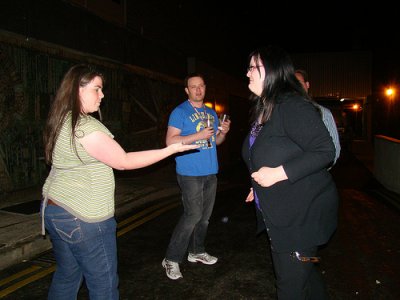Characteristics of Aspergers – “My Social Skills Are Different, And Here’s Why”
Do you wonder if a friend, loved one, or partner has Asperger’s syndrome? Characteristics of Aspergers to look for involve social skills that are different than those of the average person.
Piers Jackson* was finally diagnosed with Asperger’s syndrome as an adult. The label felt a great relief for him, explaining a lifetime of feeling different to others.
Here Piers explains for us in his own words what it’s like for him to be in social situations as a person with Aspergers.
*Name changed for privacy
[Overwhelmed by your relationship with someone who communicates differently? Just need someone to talk to? Our booking platform makes it easy to find your perfect therapist. Book today, be talking to someone online soon as tomorrow.]
“Multiple conversations are hard”
Sometimes I can absorb information straight away, at other times it takes longer. So conversation with more than two or three people is hard, because it feels like too much information to process in real time.
I listen and hear all the words but I sometimes have to ask the other person to repeat what they said as the message doesn’t sink in.
I think this is the information processing delay I’ve read about in people with Asperger’s. It sometimes happens even in one-to-one situations.
“Noise is really distracting for me”
Background chatter in a room full of people, traffic noise when outside, or numerous conversations happening at the same time in large social groups….noisy surroundings make it even harder to take in what somebody is saying.

By: Yusuke Kawasaki
And even small distractions can be impossible for my mind to ignore. Offices with clicking keyboards, jewellery tinkling, even quiet conversations at the other end of a big room.
At home, background television and other noises makes it difficult to concentrate on conversations.
People think I am not listening and get annoyed. But it’s just that unfortunately I can only deal with one thing at a time, and can’t switch attention instantaneously.
“I take things literally”
A discussion of my traits should include my black-and-white and literal interpretation of things. Before my Asperger’s diagnosis I often received comments about this.
“I can get too drawn into the details”
People also often commented about my tendency to go into detail. It caused problems when I used to get drawn into details at the expense of the big picture. After much time and effort this happens less, and I use it sparingly as a strength.
“I can be too blunt for other people”
Another of my tendencies is blunt truthfulness when speaking. I always feel driven to be precise and accurate even in personal matters. Though I think I’m getting better at adjusting my tone – if not the words.
“I need to do things the same way”

By: Matt Lucht
It’s true that if one of the characteristics of Aspergers is that routines are important.”
If I follow the same routine things are easy, but my day can be ruined if for any reason I break the regular pattern.
This can exasperate and annoy others. They don’t understand that it’s just not about changing a habit. Having an ingrained way of doing things is really important to me. A big disruption can lead to real consequences for me.
“I can go into ‘fight or flight’ mode really easily”
Back to noises. Some of them can can affect me quite badly and even sometimes cause a fight-or-flight reflex, taking me time to recover. It might be jarring noises like the squeak of a rubber trainer sole on a supermarket floor, or the scream of a small child. Sudden loud noises such as doors banging or heavy objects being dropped nearby shock me and I really jump.
“I can be emotionally detached”
Ironically my Asperger personality sometimes makes it easier to judge urgent practical matters without wasting time worrying.
I’ve read that people with Asperger’s can be very effective in the emergency services, because of the ability to be emotionally detached.
“I am often less prepared socially than others”
Lacking the instinctive awareness of others leads to stumbling into situations without time to prepare yourself.
By: vagueonthehow
I am just constantly aware that I seem to be on a different wavelength – humour, reasoning, perception, indeed most communicating and thinking processes.
“It’s not always easy but I keep trying.”
All my life, trying to understand and follow the rules and expectations of society has caused me embarrassment, confusion, frustration and even mental health issues.
People with Asperger Syndrome have to learn interpersonal skills gradually over our lifetime by continually observing, intellectualising, experimenting and making fine adjustments until we do things better. This is mentally exhausting over the course of a day.
I also think our blindness to the normal rules of society makes people with Asperger’s more prone to mental health problems. I believe depression is prevalent among us.
Asperger’s neither goes away nor gets any easier. All I can do is adjust over time and focus on how my different ways of thinking and behaving can sometimes be strengths.
Need an Asperger’s diagnosis? Harley Therapy connects you with some of London’s mostly highly regarded counselling psychologists and psychiatrists. Partner of someone with Aspergers and need some support? Our online booking platform provides affordable and fast online therapy from wherever you are.
Still have a question about characteristics of Aspergers? Or just want to share your thoughts about it? Post in the comment box below.







Isn’t Asperger’s now a passé term? I don’t like it, and my recent diagnosis described it as an ex-term but me. I like being an Autist. I know it shouldn’t usually have a capital letter, and surely Asperger’s only has because it’s named after a Name. Annoying, with a capital A regardless.
I call for a drop of capitalisation where the name is a term that isn’t usually capitalised, as happily happened for sandwiches (do you think the Earl minded?).
The official diagnosis is ‘autism spectrum diagnosis’ but many clients prefer to use Asperger’s. It’s your life, and you are more than a diagnosis. So call it what feels right for you!
Of course, leave it to a Karen to argue with a doctor.